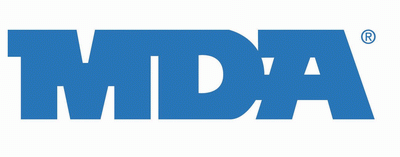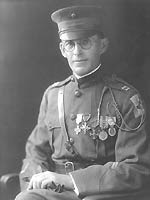Belleau Wood, 1 June to 26 June 1918
Posted: Wednesday, June 22, 2011 by Travis Cody inRe-posted from 22 June 2010.
During the month of June in 1918, the American Expeditionary Force engaged elements of the German Army at Belleau Wood, northwest of Chateau-Thierry on the River Marne in France. For an excellent account with a time line of events, I encourage you to visit Doughboy Center, the Story of the American Expeditionary Forces.
I wanted to share some of the incredible acts of audacity and bravery associated with the Marines who fought in the battle.
 Gunnery Sergeant Ernest A. Janson (1878-1930), also known as Charles F. Hoffman, stopped a German counterattack by rushing a heavily armed enemy squad that was attempting to breach his position and consolidate the high ground from which they could have devastated G/Sgt Janson's Marines. For this action, he was awarded both the army and navy Medals of Honor, one of only five Marines so honored during the war. He was the first Marine to receive The Medal for gallantry in World War I. He was also awarded the French Medaille Militaire, the Croix de Guerre with Palm, the Montenegrin Silver Medal, the Portuguese Cruz de Guerra, and the Italian Croce di Guerra.
Gunnery Sergeant Ernest A. Janson (1878-1930), also known as Charles F. Hoffman, stopped a German counterattack by rushing a heavily armed enemy squad that was attempting to breach his position and consolidate the high ground from which they could have devastated G/Sgt Janson's Marines. For this action, he was awarded both the army and navy Medals of Honor, one of only five Marines so honored during the war. He was the first Marine to receive The Medal for gallantry in World War I. He was also awarded the French Medaille Militaire, the Croix de Guerre with Palm, the Montenegrin Silver Medal, the Portuguese Cruz de Guerra, and the Italian Croce di Guerra.Gunnery Sergeant Daniel Joseph Daly (1873-1937) is one of only 7 Marines to be awarded the Medal of Honor twice. During the Boxer Rebellion in 1900, he defended a position alone against numerous enemy, inflicting heavy casualties. He received his 2nd Medal in Haiti after leading his 35 Marines in a successful defense against 400 insurgents. During the battle for Belleau Wood in World War I, G/Sgt Daly led his men across a wheat field through heavy machine gun fire, exhorting them with the cry, "Come on ya sons-of-bitches, ya want to live forever?" G/Sgt Daly was a highly regarded Marine. Major General Smedley Butler called him "The fightenist Marine I ever knew". The Gunny's awards for gallantry include the 2 Medals of Honor, Navy Cross, Distinguished Service Cross, Croix de Guerre, and Medaille Militaire.
During an assault on Bouresche, US Navy Lt JG Weedon Osborne (1892-1918), a US Navy dental surgeon, was attached to the 6th Marine Regiment. Marines are fiercely grateful for and loyal to Navy corpsmen. LtJG Osborne was awarded the Medal of Honor for his conspicuous bravery, aiding the wounded and trying to carry them to safety during fierce fighting. His citation reads, "For extraordinary heroism while attached to the 6th Regiment, U.S. Marines, in actual conflict with the enemy and under fire during the advance on Bouresche, France, on 6 June 1918. In the hottest of the fighting when the marines made their famous advance on Bouresche at the southern edge of Belleau Wood, Lt (j.g.). Osborne threw himself zealously into the work of rescuing the wounded. Extremely courageous in the performance of this perilous task, he was killed while carrying a wounded officer to a place of safety."
US Navy Lt Orlando Petty (1874-1932), a US Navy physician, was attached to the 5th Marine Regiment. While tending wounded at his aid station during the fighting near Lucy-le-Bocage, German artillery shelled the position. Some of the guns fired poison gas. Lt Petty lost his gas mask at some point, but continued to treat the wounded and get them evacuated. He was awarded the Medal of Honor. His citation reads, "While under heavy fire of high explosive and gas shells in the town of Lucy, where his dressing station was located, Lt. Petty attended to and evacuated the wounded under most trying conditions. Having been knocked to the ground by an exploding gas shell which tore his mask, Lt. Petty discarded the mask and courageously continued his work. His dressing station being hit and demolished, he personally helped carry Capt. Williams, wounded, through the shellfire to a place of safety."
Gunnery Sergeant Fred W. Stockham (1918) was recommended for the Medal of Honor for his courageous sacrifice, which was finally awarded in 1939. His citation reads, "Fred W. Stockham, Gunnery Sergeant, 96th Company, 2nd Battalion,6th Regiment, United States Marine Corps, for conspicuous gallantry and intrepidity above and beyond the call of duty in action with the enemy in Bois-de-Belleau, France, on the night of June 13-14, 1918. During an intense enemy bombardment with high explosive and gas shells which wounded or killed many members of the company, Sergeant Stockham, upon noticing that the gas mask of a wounded comrade was shot away, without hesitation, removed his own mask and insisted upon giving it to the wounded man, well knowing that the effects of the gas would be fatal to himself. Despite the fact that he was without protection of a gas mask, he continued with undaunted courage and valor to direct and assist in the evacuation of the wounded in an area saturated with gas and swept by heavy artillery fire, until he himself collapsed from the effects of the gas, dying as a result thereof a few days later. His courageous conduct undoubtedly saved the lives of many of his wounded comrades and his conspicuous gallantry and spirit of self- sacrifice were a source of great inspiration to all who served with him."
The 4th Marine Brigade, comprised of the 5th and 6th Marine Regiments and attached to the US Army 2nd Division, was awarded the Croix de guerre as a unit by the French government. The Germans allegedly dubbed the Marines Teufelshunde, or Devil Dogs, after the battle. Researchers have found stories in American newspapers that report the nickname a couple of months prior to Belleau Wood. It's clear that Marines were dubbed Devil Dogs by the Germans, but the name didn't really stick until after the battle. Whether the name came from the way Marines looked in gas masks...seeming to foam at the mouth from the constricting way the masks fit...or simply from the way they scratched and clawed and snarled their way to victory doesn't really matter so much. The name stuck, and Marines are still called Devil Dogs.
Casualties for the American Expeditionary Force included 1811 killed and 7966 wounded. It was the first time during WWI that the AEF faced such serious losses. By all accounts, either foreign or domestic, the Marines managed the missions assigned to them with valor and intrepidity in the face of the enemy.
General John J Pershing is quoted as saying, "The deadliest weapon in the world is a Marine and his rifle."
























Heros All! Thanks for an interesting and informative post Trav.